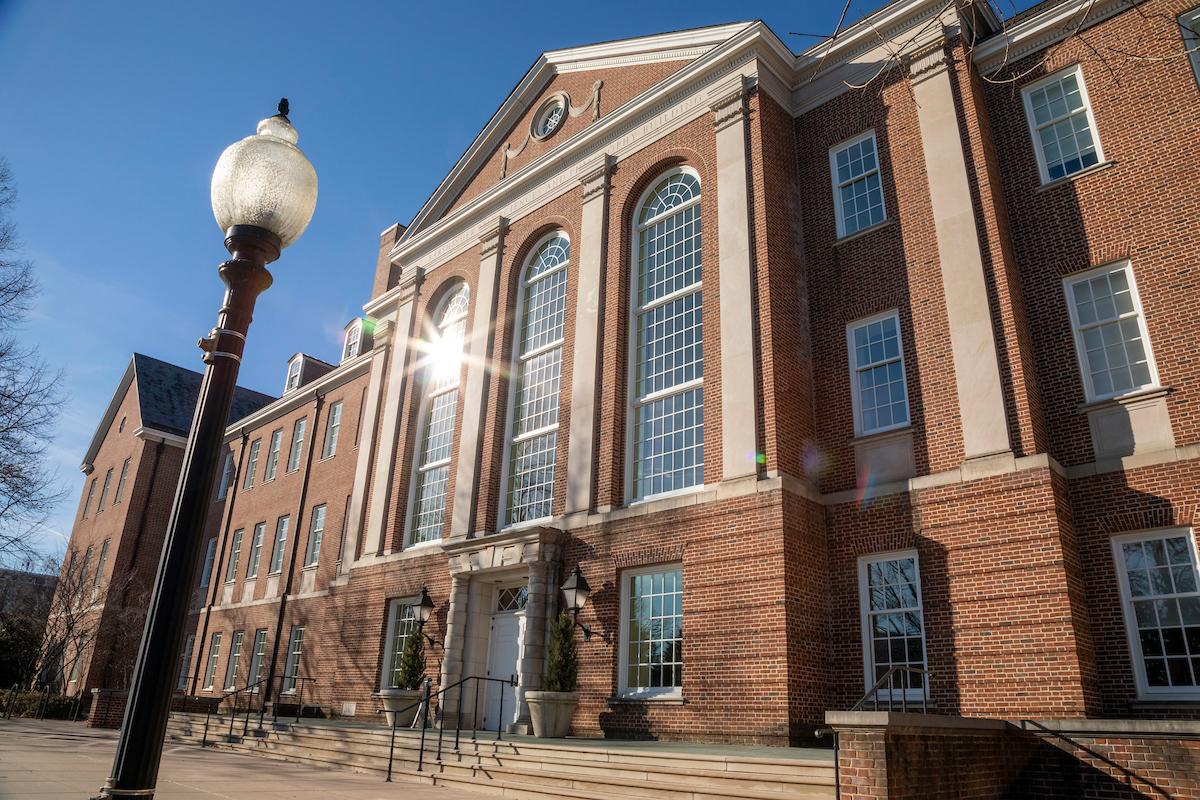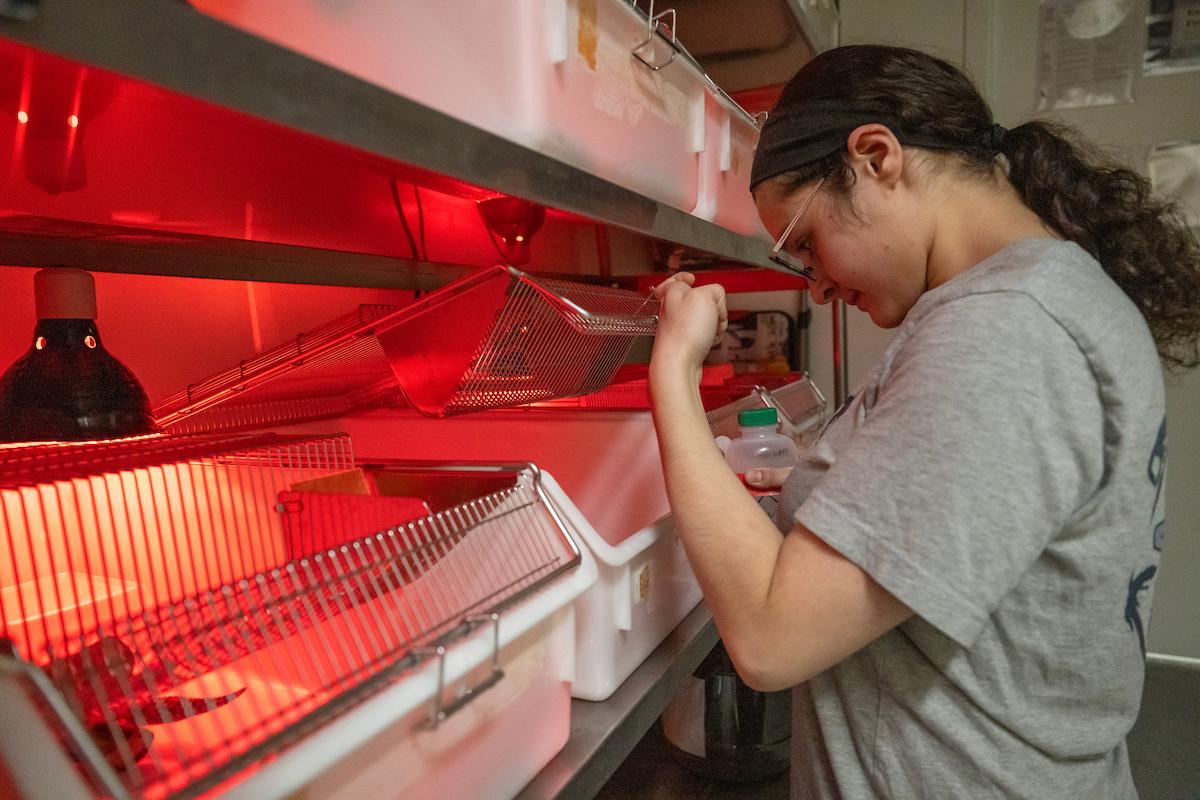Neuroscience
About Neuroscience
Our Program and Courses
Hands-on learning is a critical focus of the neuroscience curriculum. Many of our students work directly in the laboratory on challenging research projects designed by students and funded by federal research grants. Along with your professors, you will have the opportunity to work on original research projects that may be presented at conferences or in journals.
By the time you graduate, you will be able to demonstrate:
- A knowledge of the biological foundation of the brain and nervous system.
- A complex understanding of how the biological and psychological facets of the brain are interrelated.
- The ability to understand, perform, and report on the results of experiments and research.
- An eye for identifying areas of research that would benefit from additional support or data, and follow through with collecting that data.
- Critical and analytical thinking and the ability to communicate observations and discoveries through the printed and spoken word.
- The ability to collaborate effectively in a manner that translates to the professional arena.
Learning Outside the Classroom
Research Opportunities
Every student at F&M has extraordinary opportunities to engage in independent or faculty-led research. Our neuroscience faculty are engaged, accomplished scholars who conduct groundbreaking work and weave their ongoing research into their courses. You’ll uncover myriad opportunities to conduct research — including in our on-campus vivarium — on the neural mechanisms that create behavior.Explore research at F&M
Honors in Neuroscience
Completing research or an independent study could also lead you to earn honors in neuroscience. To be considered for honors, you must first complete an advanced research project and be sponsored by a professor. You will then present your research findings to faculty and students.Off-Campus Study
To push the boundaries of the learning experience, students regularly choose to study abroad. Previous neuroscience students have visited Australia, Costa Rica, Kenya, Tanzania, New Zealand, the United Kingdom, Galápagos, Hungary, and Denmark.Explore off-campus study at F&M
Our Facilities

The Barshinger Life Sciences & Philosophy Building (LSP)
The Barshinger Life Sciences & Philosophy Building (LSP) gives you access to state-of-the-art
resources for studying neuroscience, including access to the teaching and research
laboratories in neuroscience, cell and molecular biology, and physiology. LSP houses
multiple advanced microscope systems (including a recently-acquired laser confocal
microscope) and an advanced neurochemistry lab. Vivarium
F&M’s Vivarium is a non-invasive behavioral facility housing a diverse range of species—including rodents, reptiles, birds, fish, and nonhuman primates—that supports student-focused learning and scientific research. We are one of the only institutions in the United States offering undergraduate students direct access to onsite nonhuman primates through an established program built around training, enrichment, and animal caretaking. Each year, more than 150 F&M students work with faculty and Vivarium staff to gain hands-on experience within the fields of positive reinforcement training, welfare and enrichment, best-practice animal caretaking, and behavioral observations and research. We also offer an Animal Husbandry & Primate Training Certificate, which includes formal academic training designed to develop students’ abilities to professionally train and care for animals.Success Beyond F&M
Graduate School
Many neuroscience graduates go onto medical school or to pursue advanced degrees in related fields such as neuroscience, biomedical science, neurobiology, and behavior. They’ve attended institutions such as:- Columbia University
- Drexel University College of Medicine
- Georgetown University
- Harvard Medical School
- Johns Hopkins University
- Pennsylvania College of Health Sciences
- Rutgers University
- Yale University School of Medicine
Career Paths
Healthcare and scientific research and development are popular career paths for neuroscience graduates. They hold positions such as:- Cognitive Therapist
- Clinical Research Associate
- Market Researcher
- Naturopathic Physician
- Neurosurgeon
- Pediatrician
- Physician
- Research Scientist
- Surgeon
- Veterinarian
- Veterinarian Surgical Assistant
Student Spotlight
“Making people feel heard and providing them with resources ... that makes me look forward to [a career in medicine].”
Read More »
Student Spotlight
“I chose to attend F&M because of the amazing pre-med program. There was no other college I was looking at that had numbers even close to the statistics of F&M (for getting into medical school).”
Read More »
Alumni Spotlight
Conducting Research at a Harvard Medical School Laboratory
Read More »
Related Fields of Study
Biology
The biological sciences expand and advance frontiers of knowledge about all forms of life. From molecules to ecosystems, from oceans to deserts, from the distant past to present day, biology gives you insights into other species, ourselves, and our world.
Psychology
Embark on a journey of the mind and learn all about why we do the things we do. From non-human animal behavior to language development and neurological impairment, your time spent studying psychology at F&M will unlock a whole new world of understanding of how the brain works.
Pre-Medical Advising
Begin your career in an essential, effective, and rewarding field. When you pursue F&M’s pre-medical program — offered as a supplement to your chosen major — you’ll find all the guidance and support you need to build a sturdy foundation for a successful future in medicine.
Neuroscience at F&M in Action
February 27, 2025
From Classroom to Published Research: Seizing Every Opportunity at F&M
Jackson Milone ’25 isn’t waiting for medical school to make his impact in the sciences — he’s already done it: He’s a co-author for two peer-reviewed papers. He volunteers for Crisis Text Line. And, he's worked with F&M Dining staff to ensure students with medical conditions have additional meal options and flexibility.
October 10, 2024
Sophomore Gains Clinical Experience Over the Summer
F&M sophomore Hanna Winslow spent the summer becoming an EMT, working alongside an ambulance company as well as emergency and respiratory departments. “Sitting in a class and then actually going into a facility and practicing what you learn is so different,” she said.
June 6, 2024
Success Beyond F&M: Conducting Research at a Harvard Medical School Laboratory
Holly Batchelder ’23, who majored in neuroscience and minored in applied mathematics at F&M, originally thought she’d go directly to medical school. But instead, she’s secured a job completing exciting research at a prestigious Harvard Medical School laboratory before attending med school.

